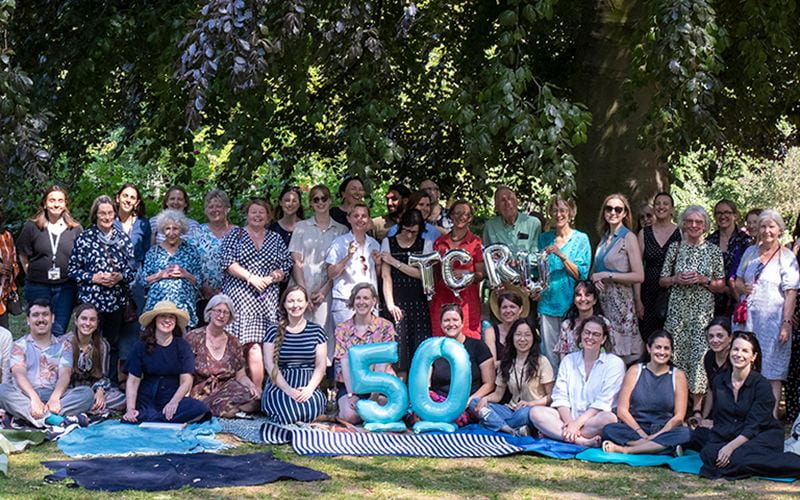The Thomas Coram Research Unit at 50: looking back to look forward?
By Blog Editor, IOE Digital, on 31 October 2023

Credit: Mary Hinkley for UCL.
31 October 2023
By Peter Moss
In a contemporary context of profound transitions and converging crises, it seems time to reconsider and reprioritise the role that social research can play in creating public policies, including services, that are relevant to rebuilding a world that is more just, more democratic, more sustainable and more caring. In this scenario, strategic social research, including an element of experimentation, may have a major part to play in what has been described by one commentator, Geoff Mulgan, as ‘expand[ing] our shared possibility space, the options for our societies… to populate our fuzzy pictures of the future with complex, rich, plausible [i]deas, pictures of the possible’.
Such concerns and such an approach are not new; they were founding principles of the Thomas Coram Research Unit (TCRU). They have, though, not always been easy to sustain. As TCRU marks its 50th anniversary, it is an important moment to reiterate that broader role for social research alongside that which responds to more immediate questions. Our celebrations culminate on 7th November with an event to launch a book, ‘Social Research for our Times’, which contains contributions from many past and present members of the Unit. It provides an introduction to the wide range of social research undertaken by TCRU over the decades (under two broad headings of ‘Services and policies for children, young people and families’ and ‘Family life, gender and minority communities’), as well as to the innovative research methods that TCRU has developed. And because of the enlightened policy of UCL Press, the book can be accessed free online.
Opening its doors in 1973, TCRU was the product of the vision and reputation of its first Director, Professor Jack Tizard, and the backing of a government department, the then Department of Health and Social Security. Tizard wanted his new Unit to be doing social research that was closely related to policy, including services and practice. What sort of relationship? He was not opposed to undertaking what he called ‘tactical’ work, responding to questions posed by policy makers and addressed to specific and immediate problems. Overall, though, he was doubtful if this approach would ‘answer any but the most superficial questions’.
Instead, he wanted TCRU to focus on ‘strategic’ research ‘concerned with problems that were of considerable generality and importance, likely to endure over a period of decades.’ This meant research that was future-oriented, multi-disciplinary, long term and multi-layered. Following this principle, the Unit from day one focused on the field of early childhood services. These services in the early 1970s were, in Tizard’s view, totally inadequate after years of government disinterest, and ill equipped to cope with the increasing demand he foresaw for them.
What was needed, he thought, was a total overhaul, with a new type of service offering education and care and a range of other services to all families with young children in its catchment area – free of charge, too, like other essential children’s services such as health and schools. This new service he called the ‘Children’s Centre’. In its early years TCRU helped set up two pilot Centres in London and conducted research about them and the families using them.
Governments of the day and subsequently ignored this work, and early childhood services continued to languish – until 1997, when the New Labour government made early childhood one of its flagship policies. They also rediscovered Children’s Centres, opening 3,600 in just seven years, an extraordinary achievement. Sadly, though, these Centres did not initiate a new universal service, but were grafted on to the existing hotchpotch of fragmented services; under later Conservative governments, they have been neglected and allowed to wither.
Yet, Tizard’s idea of Children’s Centres – universal, integrated, multi-purpose and free services – has arguably become more, not less, relevant; they provide a proven alternative to the deeply flawed early childhood system that has evolved over the years, fragmented, socially divisive, unresponsive to need and costly. Tizard envisaged Children’s Centres as an important addition to the welfare state, universal but attuned to local needs; today’s depleted Children’s Centres and modest Family Hubs are pale shadows of that optimistic vision.
As I have already indicated, Tizard’s commitment to strategic social research also still resonates today. As Mulgan elaborates, the recent trend of diverting of social research to the tactical and the here and now is unlikely to serve society well on its own: “Healthy pressures to attend to hard data and evidence have had the unintended consequence of squeezing out attention to the future since by definition evidence and data refer to the past and present. A well-intentioned focus on impact has encouraged incremental work on policy – how to tweak a little, ideally aligned with the interests of the government of the day but discouraged the serious design of how our society or economy might be a generation out.”
Jack Tizard would agree. Funding and other conditions today are far less favourable to ‘strategic’ research than in 1973. But despite this, as the new book showcases, our founder’s thinking on social research has remained foundational to TCRU’s work, in early childhood services and beyond.
Social Research for our Times (UCL Press) is published on 6 November, free to download. Register here to join us for the book launch event.
 Close
Close



